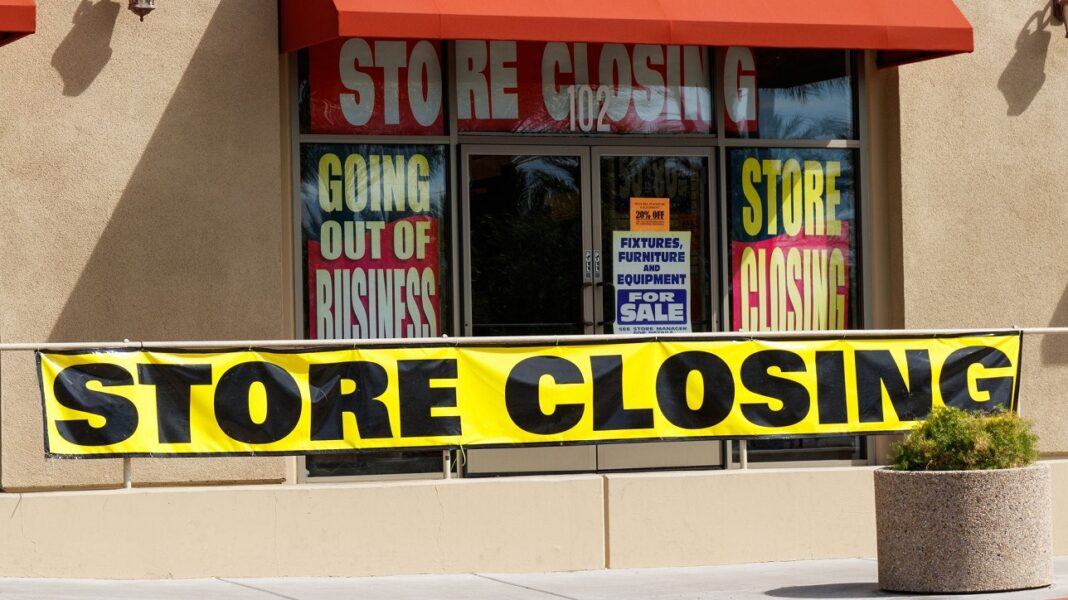
While President Donald Trump touts how amazing the economy is in America, small business owners would strongly disagree. Many that had to close once COVID-19 hit have found that they were no longer able to open again. All of the misinformation about the pandemic and stops and starts have just driven over 150,000 business to close and nearly 100,000 of those won’t be reopening.
Many online news sites have taken a hit laying off employees including Buzzfeed, Vox and Axios. It does seem strange in a period where everyone is looking for news that over fifty local newsrooms have closed in America. We at Movie TV Tech Geeks have been fortunate that our business model keeps us safe during a pandemic, and hopefully more of our news brethren online can keep going strong through this period.
Wednesday saw that review site Yelp released its latest Economic Impact Report, revealing business closures across the U.S. are increasing as a result of the coronavirus pandemic’s economic toll.
As of Aug, 31, 163,735 businesses have indicated on Yelp that they have closed. That’s down from the 180,000 that closed at the very beginning of the pandemic. However, it actually shows a 23% increase in the number of closures since mid-July.
In addition to monitoring closed businesses, Yelp also takes into account the businesses whose closures have become permanent. That number has steadily increased throughout the past six months, now reaching 97,966, representing 60% of closed businesses that won’t be reopening.
“Overall, Yelp’s data shows that business closures have continued to rise with a 34% increase in permanent closures since our last report in mid-July,” Justin Norman, vice president of data science at Yelp, told media outlets.
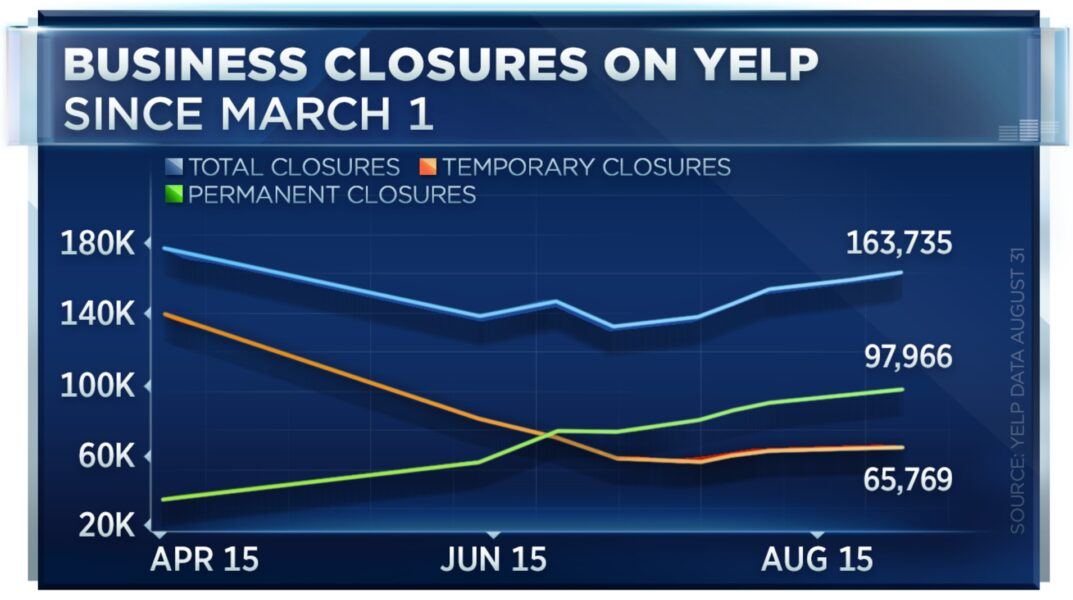
Yelp’s September report marks six months since March 1, the date that the company considers to be the beginning of the business crisis.
In order to gather closure data, Yelp monitors changes in business hours or descriptions on its app, offering an immediate, localized view of the impact the pandemic has had on small businesses.
“Despite the hard hit small businesses have certainly taken, we’ve seen that home, local, professional and automotive services have been able to withstand the effects of the pandemic better than other industries,” Norman noted.
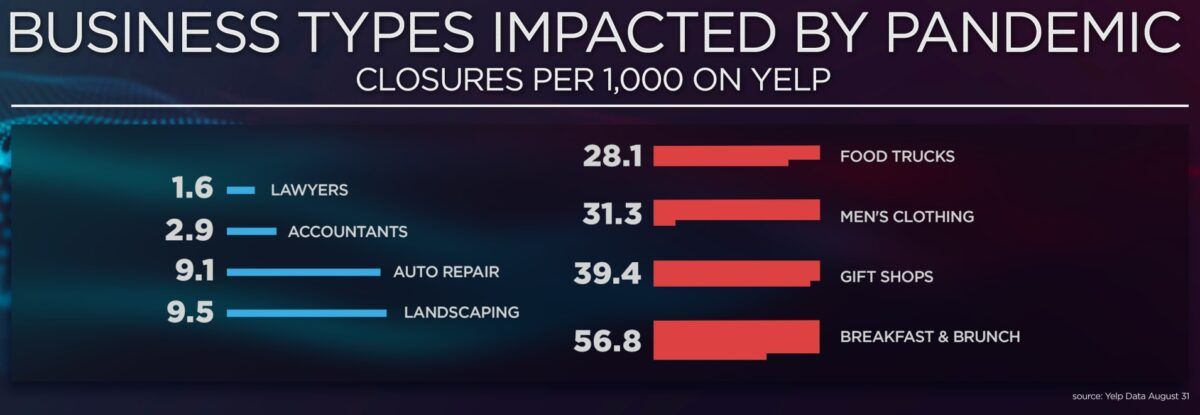
The data supports the trend that most consumers are choosing to stay home over patronizing establishments physically, as home and professional services such as landscapers, contractors and lawyers, see a much lower closure rate than clothing stores and even home decor businesses. Auto and towing services also reported a relatively low closure rate.
“Consumers still need these services,” Norman said. “Through the rise of virtual consultations, and contactless or socially distanced services, these businesses have been particularly resilient during this time.”
Throughout the past six months, restaurants, bars and nightlife venues have been hit the hardest by the restrictions brought by the pandemic: 32,109 restaurants have closed, as of Aug. 31. The number of restaurants forced to permanently close is slightly above Yelp’s total average, at 61%.
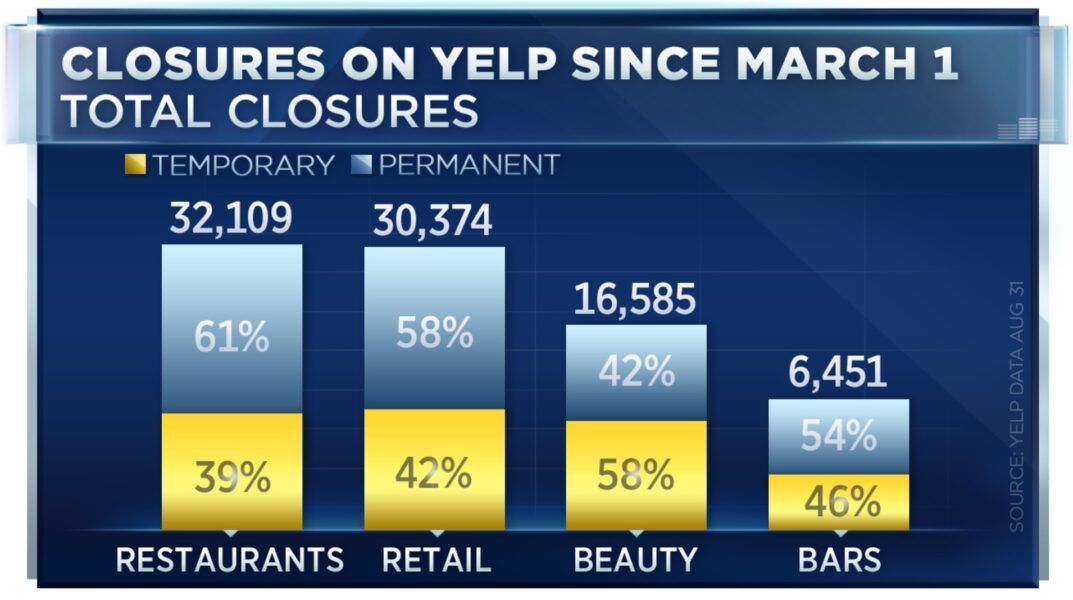
Yelp has also noted that businesses already well suited for takeout, such as pizza places, coffee shops and delis, are treading water better than other restaurants. The types of restaurants with the highest closures include breakfast and brunch places, sandwich shops, and Mexican restaurants.
Norman noted that policy changes in the coming weeks and months could have an impact on whether these closures turn permanent. “The continued rollout of indoor dining, especially in metros like New York City, will be worth watching as it will be critical for businesses to maintain the right balance of practicing social distancing and other responsible safety measures to ensure they can stay open.”
Bars and nightlife venues have also seen a large impact from the pandemic, as a business that can’t adapt as easily to outdoor dining or takeout. Despite being a sector that is six times smaller than restaurants, 6,451 venues have closed. The rate of permanent closures has increased 10% since July, now sitting at 54%.
Retail saw a similar increase in permanent closures since July, rising 10% to a total of 58% indicated permanent. That’s out of 30,374 closed retail businesses.
The report showed a surprising month-over-month rise in permanent closures for beauty businesses — since July, about 42% more businesses were indicated as permanently closed. Total closures for the beauty industry sit at 16,585, which is a 22% increase since July.
Different states are also facing varying degrees of closures, and perhaps unsurprisingly, Yelp sees a correlation between states with a high number of closures and states with a high unemployment rate. Looking at closures per 1,000 for each state, Hawaii has been hit the hardest, followed by California, Nevada, Arizona and Washington state. Hawaii’s unemployment rate sat at 13% in July, and the state also relies heavily on tourism.
“Due to the pandemic, these states were greatly impacted by travel restrictions and also face high rates of unemployment,” said Norman. “These states are also home to the hardest-hit metros including Las Vegas, Honolulu and several of the largest California urban areas like San Diego, San Francisco, San Jose and Los Angeles.”
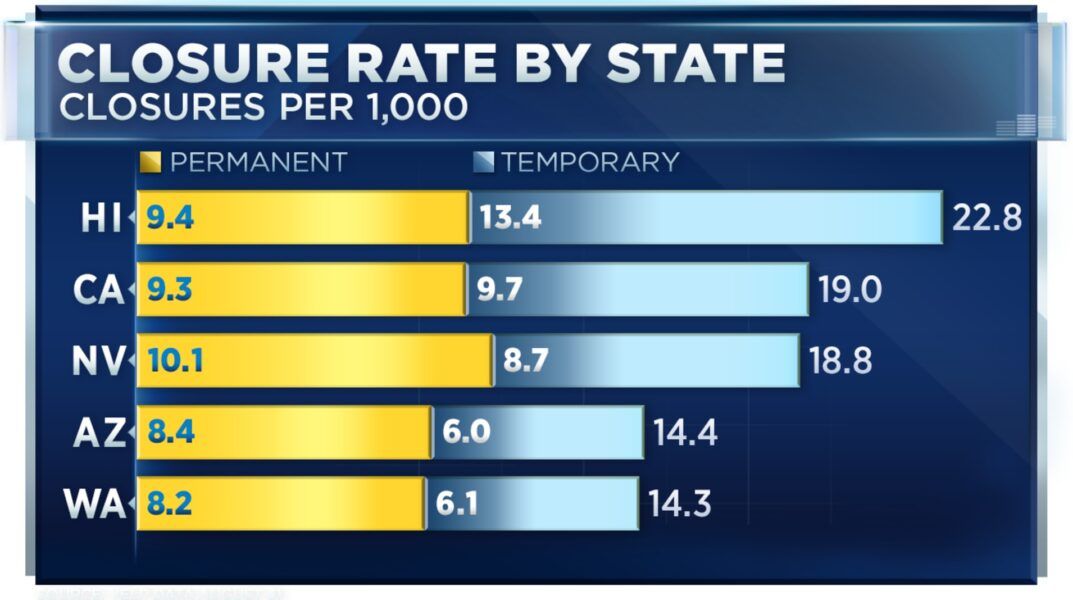
Yelp has also noted discrepancies between large cities, where closures are higher and businesses are not faring as well, and smaller areas, which have proved more forgiving to small businesses. Los Angeles and New York report the highest number of closures: Los Angeles has seen 15,000 closures, half of which are permanent, and New York has seen more than 11,000 closures, with a high rate of 63% reported as permanent.
“Meanwhile, we’re actually seeing larger metros with fewer closures in the East, including Pittsburgh, Philadelphia, and Baltimore,” Norman noted.
Ultimately, Yelp’s data shows that Main Street is still feeling the economic impact of the pandemic, and many states and areas of business may not see a recovery soon.
“While it’s hard to say when we can expect business closures to stabilize, we’ve continued to see businesses successfully adapt to these uncertain times over the last six months thanks to their own hard work, innovation and local policy changes,” Norman said.
Some of the larger stores shutting down or a large percentage of stores are below as per Business Insider. Retailers will be closing over 6,300 stores in 2020 with even more planned in 2021. This doesn’t bode well for those of us who still like to get out in the real world as 2019 saw more than 9,300 stores close, which broke the prior record of 8,000 stores closing in 2017. Before the coronavirus pandemic hit, real estate firm, Cushman & Wakefield, had estimated that as many as 12,000 major chain stores would be closing in 2020.
List is in order of number stores closing:
Tailored Brands: 500 stores
Pier 1 Imports: 450 stores
RTW Retailwinds: up to 378 stores
GameStop: 320 stores
Signet Jewelers: 300 stores
Stein Mart: 279 stores
Papyrus: 254 stores
GNC: 248 stores
Victoria’s Secret: 238 stores (the Jeffrey Epstein scandal didn’t help the owner of this company either)
Gap: 230 stores
Tuesday Morning: 230 stores
Walgreens: 200 stores which is in addition to their plan to cut another 750 stores in 2020
The Children’s Place: 200 stores
Chico’s: 200 stores
Wilsons Leather, G.H. Bass: 199 stores
Destination Maternity: 183 stores
Forever 21: 178 stores
PVH Corp: 162 stores
JCPenney: 155 stores
Modell’s: 153 stores
A.C. Moore: 145 stores
Macy’s: 125 stores
Art Van Furniture: 125 stores
Bose: 119 stores
Guess: 100 stores
Microsoft: 83 stores
Olympia Sports: 76 stores
Sur La Table: 56 stores
Sears: 51 stores in addition to 96 closed in February 2020
Brooks Brothers: 51 stores
Earth Fare: 50 stores
Bath & Body Works: 50 stores
Kmart: 45 stores
Bed, Bath & Beyond: 44 stores
Lucky’s Market: 32 stores
Express: 31 stores
Neiman Marcus: 20 stores
Nordstrom: 19 stores
Lord & Taylor: 19 stores
The Frye Company: all 16 stores
Hallmark: 16 stores
Rent the Runway: all 5 stores
Walmart: 3 stores

